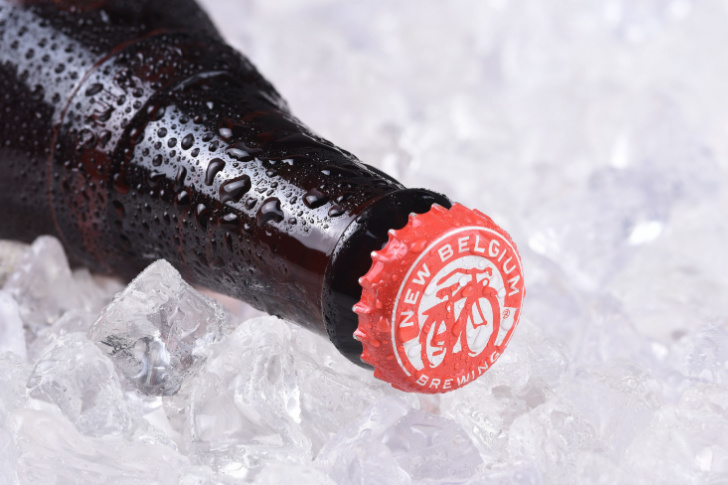New Belgium Brewing CFO: How to balance profits with a strong ESG agenda
The CFO spoke to Danielle McLarnon, CFO at New Belgium Brewing Company, about why she believes the total pursuit of profits at any cost will eventually lead to failure
The CFO spoke to Danielle McLarnon, CFO at New Belgium Brewing Company, about why she believes the total pursuit of profits at any cost will eventually lead to failure

New Belgium Brewing Company is a nationally distributed brewery in the US. It has grown rapidly since its formation in 1991 to become the fourth largest craft brewer in the country and, as of 2017, available in 50 states. Today, New Belgium brands are distributed in Canada, Australia, Japan, South Korea, Sweden and Norway.
Since its formation, the company has followed a firm Environmental, Social and Governance (ESG) agenda and committed to putting people and communities first – something that has given rise to its definition as a “human-powered” brewery.
“Our experience at New Belgium tells us that business success is achieved by balancing profits alongside the vital requirement to take care of our environment, our people, and our communities. It’s a cyclical function,” says McLarnon. “We need to remain profitable to ensure our ability to invest in our people, communities, and our craft – without which we would not exist.”
She believes that much of corporate America has put worker well-being and the health of the planet in the back seat for several decades to satisfy investor demand for maximum quarterly earnings.
“When we were founded over 30 years ago, New Belgium began challenging that notion by betting on the idea that investing in people and communities leads to a more successful and resilient business. This approach evolved into a concrete business model we call ‘Human Powered Business’,” she says.

McLarnon says that New Belgium’s business model is based on four key principles: Making world-class beer; looking after its people; inspiring social and environmental change; and enjoying what it does.
The model has brought in a style of governance, which includes having a diversity, equity and inclusion co-worker council made up of employees who are representative of the entire workforce. The council aims to embed equity into business practices; create an inclusive workplace; and attract and retain a workforce that mirrors the communities where the company is doing business.
It aims to achieve financial transparency too by allowing all co-workers a seat at the financial table so that they understand the health of the business and how their work contributes to it.
The company’s commitment to its people also includes always meeting minimum wage requirements, providing access to an onsite medical clinic and reduced health insurance premiums, as well as offering benefits for LGBTQ+ members and their spouses. It also fosters shared investment in company success through profit sharing.
“We implement these principles daily throughout every facet of our business, and we hold ourselves accountable through strong governance systems and third-party oversight,” says McLarnon.
“People drive our business forward, and, in return, the business puts co-worker and community well-being at the centre of everything we do. We have proven that our business benefits when the people who power it prosper.”
She adds that the results of this approach are reflected in New Belgium’s workforce, which has expanded by 89% since 2010 with the addition of 326 new jobs. The average tenure at New Belgium is 7.5 years. The company’s revenues have grown by 61% since 2010 and sales volumes have increased 426% since 2000.
McLarnon explains that as the CFO of New Belgium, she often must look in two directions at the same time – tracking the company’s month-by-month financial performance so it can meet its goals and share profits with its co-workers, while also maintaining a close eye on the future. This includes considering what investments the company can make today to support workforce well-being; the funding decisions that will make its communities prosper economically and socially; and what needs to be done for the business to thrive.
“We live in an era in which climate change is already drastically increasing the cost of raw materials required to brew world-class beer, so we must consider how to mitigate risk by investing in innovative climate solutions,” she says.
As the CFO she works in close partnership with the company’s chief ESG officer on emerging regulatory requirements and how the company can participate in offering solutions to potential issues, as well as debating areas of tension between this year’s needs and the needs of the business in 10, 20, or even 50 years’ time.
“Many ESG initiatives and investments may not be obvious in the numbers on the financial statements, and it can be hard to calculate a financial return on investment from initiatives that result in more organic benefits to the company such as greater customer engagement, the ability to recruit top talent, brand reputation, and dedicated co-workers,” says McLarnon.
“To quantify the financial impact of these investments and to protect these priorities when there are other competing human and financial resource constraints, we have prioritised the responsibilities of one of our analysts to include modelling the financial impact of ESG requests.”
According to McLarnon, the wider finance team is also very focused on amplifying the company’s ‘Human Powered Business’ principles and practices in all financial planning and team meetings and by encouraging participation in co-worker councils.
“From a financial perspective, we make it a priority to protect budgetary operational spends and allocate capital dollars to ensure we meet our goals around inspiring social and environmental change,” says McLarnon.
“We consider the environmental impact of our business and work relentlessly to reduce it. Therefore, we have embedded climate action into our books, and put the entire company on track to certify all brands are carbon neutral by 2030 and reach net-zero by 2050.”
This also extends to the wider community, she adds.
“We give $1 for every barrel of beer sold to non-profit organisations working to solve the world’s most pressing social and environmental issues and have donated more than $30 million to date.”
McLarnon points out that while two of New Belgium’s brands are now carbon neutral, the first one to achieve this has donated nearly $17m to non-profit organisations working on climate solutions, as well as land and water conservation.
The company has also participated in environmental advocacy at local and federal level and has built a responsible sourcing code for its vendors. It has been a certified B-Corp (for-profit company certification of their social and environmental performance) since 2012.